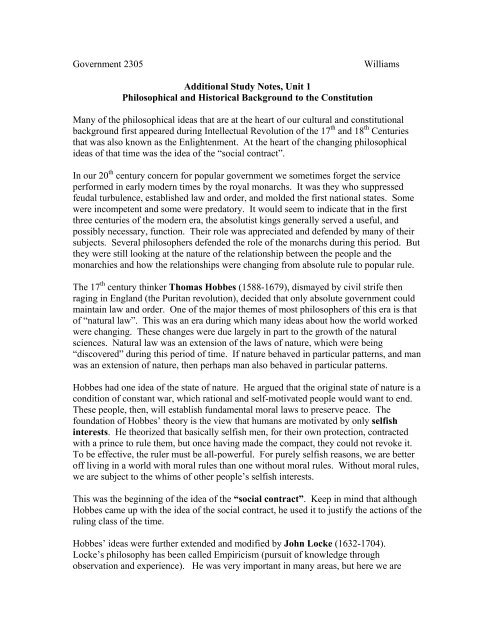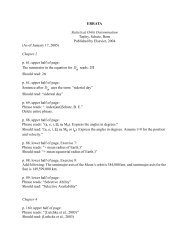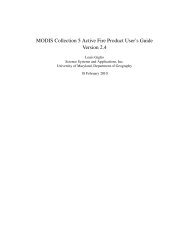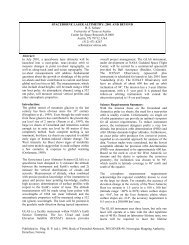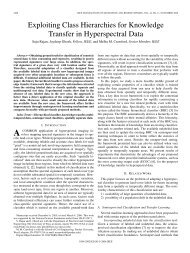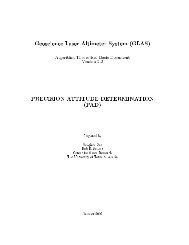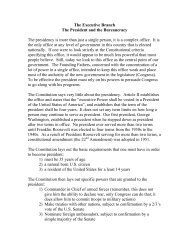Additional Study Notes Chapter 2 (PDF format)
Additional Study Notes Chapter 2 (PDF format)
Additional Study Notes Chapter 2 (PDF format)
- No tags were found...
You also want an ePaper? Increase the reach of your titles
YUMPU automatically turns print PDFs into web optimized ePapers that Google loves.
Government 2305<br />
Williams<br />
<strong>Additional</strong> <strong>Study</strong> <strong>Notes</strong>, Unit 1<br />
Philosophical and Historical Background to the Constitution<br />
Many of the philosophical ideas that are at the heart of our cultural and constitutional<br />
background first appeared during Intellectual Revolution of the 17 th and 18 th Centuries<br />
that was also known as the Enlightenment. At the heart of the changing philosophical<br />
ideas of that time was the idea of the “social contract”.<br />
In our 20 th century concern for popular government we sometimes forget the service<br />
performed in early modern times by the royal monarchs. It was they who suppressed<br />
feudal turbulence, established law and order, and molded the first national states. Some<br />
were incompetent and some were predatory. It would seem to indicate that in the first<br />
three centuries of the modern era, the absolutist kings generally served a useful, and<br />
possibly necessary, function. Their role was appreciated and defended by many of their<br />
subjects. Several philosophers defended the role of the monarchs during this period. But<br />
they were still looking at the nature of the relationship between the people and the<br />
monarchies and how the relationships were changing from absolute rule to popular rule.<br />
The 17 th century thinker Thomas Hobbes (1588-1679), dismayed by civil strife then<br />
raging in England (the Puritan revolution), decided that only absolute government could<br />
maintain law and order. One of the major themes of most philosophers of this era is that<br />
of “natural law”. This was an era during which many ideas about how the world worked<br />
were changing. These changes were due largely in part to the growth of the natural<br />
sciences. Natural law was an extension of the laws of nature, which were being<br />
“discovered” during this period of time. If nature behaved in particular patterns, and man<br />
was an extension of nature, then perhaps man also behaved in particular patterns.<br />
Hobbes had one idea of the state of nature. He argued that the original state of nature is a<br />
condition of constant war, which rational and self-motivated people would want to end.<br />
These people, then, will establish fundamental moral laws to preserve peace. The<br />
foundation of Hobbes’ theory is the view that humans are motivated by only selfish<br />
interests. He theorized that basically selfish men, for their own protection, contracted<br />
with a prince to rule them, but once having made the compact, they could not revoke it.<br />
To be effective, the ruler must be all-powerful. For purely selfish reasons, we are better<br />
off living in a world with moral rules than one without moral rules. Without moral rules,<br />
we are subject to the whims of other people’s selfish interests.<br />
This was the beginning of the idea of the “social contract”. Keep in mind that although<br />
Hobbes came up with the idea of the social contract, he used it to justify the actions of the<br />
ruling class of the time.<br />
Hobbes’ ideas were further extended and modified by John Locke (1632-1704).<br />
Locke’s philosophy has been called Empiricism (pursuit of knowledge through<br />
observation and experience). He was very important in many areas, but here we are
most concerned with his contributions to political thought. Locke argued that the state of<br />
nature is a pre-political, yet moral society, where humans are bound by divinely<br />
commanded natural law. A social contract is made between citizens who institute a<br />
government to prevent people from occasionally violating natural law. In his book, “Two<br />
Treatises on Government”, he argues that man has “natural rights”, and that among<br />
these are life, liberty, and property. To safeguard these rights, man voluntarily<br />
contracted to surrender a certain amount of his sovereignty to government. Government<br />
must be built on the consent of the governed, people must agree on who their rulers are.<br />
Government must also be a limited government; that is, there must be clear restrictions<br />
of what rulers can do. Indeed, the sole purpose of government is to protect “natural<br />
rights”. No government can violate the individual’s rights to these things, if it does the<br />
people who set it up can and should overthrow it.<br />
The idea that certain things were beyond the realm of government contrasted sharply with<br />
the traditional notion that kings had been divinely granted absolute rights over subjects.<br />
Here we begin to see the change from the justification of power by the monarchies, as<br />
defended by Hobbes, to one where the justification for governing comes from those being<br />
governed.<br />
Two limits on government were particularly important to Locke. First, governments<br />
must provide standing laws so that people know in advance whether their acts will be<br />
acceptable. Second, and Locke was very forceful on this point, “the supreme power<br />
cannot take from any man any part of his property without his consent”. To Locke, “the<br />
preservation of property was the end of government”.<br />
Baron de Montesquieu (1689-1755) was less a theorizer than a discerning student of<br />
history and a shrewd analyst of political systems. In his book, The Spirit of the Laws, he<br />
came to the conclusion that different types of governments are best suited to various<br />
conditions. For instance, absolute monarchy is best for countries of vast area, limited<br />
monarchy for countries of moderate size like France, and republics for small states like<br />
Venice or ancient Athens. Not only did he approve of Locke’s doctrine of limited<br />
sovereign, but he specified how it can best be secured – by a separation of powers and a<br />
system of checks and balances. The powers and functions of government should be<br />
equally divided among kings, lords, and commons, each on being checked by the other<br />
two. His model was converted into executive, legislative, and judicial branches in the<br />
American system.<br />
Also during this era, a lot was changing in the thought of how economic systems<br />
functioned. Some French thinkers began to teach that economics has its own set of<br />
natural laws, that the most basic of these laws is that of supply and demand, and that<br />
these laws operate best when commerce is freed from governmental regulation. This<br />
doctrine came to be known as that of laissez faire (or free trade and enterprise). The<br />
chief formalizer of the theory of laissez faire was Adam Smith, a Scottish professor of<br />
philosophy who spent time in France. His “Wealth of Nations” was published in 1776<br />
and has remained the bible of laissez faire economics ever since. This is the basic<br />
economic philosophy that has dominated our culture for over two centuries.
As we can see, a lot of social changes were occurring during the period leading up to the<br />
American Revolution. This revolution was a fairly complex movement, more appropriate<br />
for history classes, but some things we should know here. It was not a revolution for<br />
social changes! It was a very conservative revolution in that it set out to keep things that<br />
the colonists felt were their rights that were being denied to them by the British.<br />
Foremost, in the century and a half prior to 1776, American society had become<br />
fundamentally different than British and European societies. America was<br />
geographically distant from Europe, and this was a major factor. The size of the<br />
American continent also was a factor, offering many opportunities to those brave enough<br />
to venture into the new frontiers. There were also economic differences from Europe.<br />
The colonial economy was a diversified agricultural economy, and had grown to be<br />
independent of Britain. There was the growing development of merchants and<br />
manufacturing, beginning of trade with other nations (mostly raw materials). The<br />
Colonies were not totally self-sufficient, but they were not totally dependent on Britain<br />
and Europe. American entrepreneurs were intent on protecting and expanding their own<br />
interests, and wanted to do so more and more without constraints.<br />
There were also growing social differences from Europe. Almost none of Europe’s<br />
aristocracy had immigrated to America. American aristocracy was based on wealth<br />
rather than on blood. It was possible for an enterprising and lucky man of the lower<br />
classes to attain aristocratic rank by amassing a fortune. The frontier also offered an<br />
opportunity to men of humble origin, who resented aristocratic dictation, to achieve rank<br />
and privilege.<br />
Finally, there were the political differences. Although each colony had its own<br />
government, a common pattern had developed by 1776. Each colony had a governor who<br />
represented the authority of the British crown and who was usually chosen by the king.<br />
Each colony (except Pennsylvania) had a two-house legislature. The lower house was<br />
elected by property owners, while the upper house was usually appointed by the British<br />
king or by the governor. Governors did have power of veto over legislature, but did not<br />
exercise this often for fear of political reprisal. The court system was patterned after<br />
British courts and had incorporated the tradition of English common law, which included<br />
the right to a trial by a jury, and due process of law.<br />
The colonial governments had grown increasingly accustomed to a wide range of<br />
freedom, and the colonists increasingly felt that it was their right to decide their own fate.<br />
Keep in mind that the most Americans were still very much Englishmen, and still closely<br />
attached to their European tradition.<br />
The relationship between the colonies and England began to change with a modification<br />
in English policies after 1763. On the English side, they had just finished fighting the<br />
Seven Years’ war (also called the French and Indian War) in America. It had been<br />
marked by a refusal of the Americans to raise troops and money, their blatant trafficking<br />
with the enemy (France), and by open defiance of the royal authority. This made
England realize how inadequate her system of control over the colonies was. This also<br />
left England with a huge debt, incurred in part to save the Americans from the French and<br />
the Indians. In the minds of the English taxpayers it was time for the ungrateful colonials<br />
to pay up.<br />
From here, you should be able to rely on your textbook for in<strong>format</strong>ion leading up to the<br />
Revolutionary War. Keep in mind we are not too worried about the details of the war<br />
(they are usually covered in American history classes). We are more concerned with the<br />
development of the colonial system of government, first with the Articles of<br />
Confederation, then the Constitution.<br />
Sources:<br />
Russell, Bertrand: A History of Western Philosophy, Simon and Schuster, 1945.<br />
McLlelland, J.S.: A History of Western Political Thought, Routledge, 1996.


